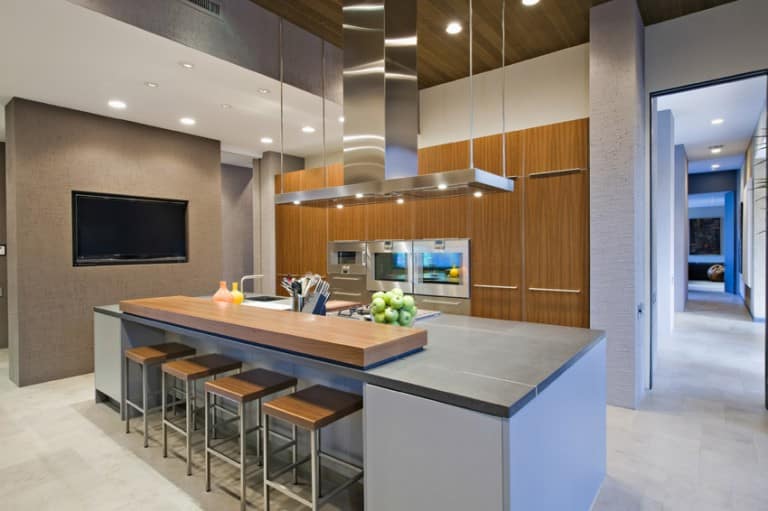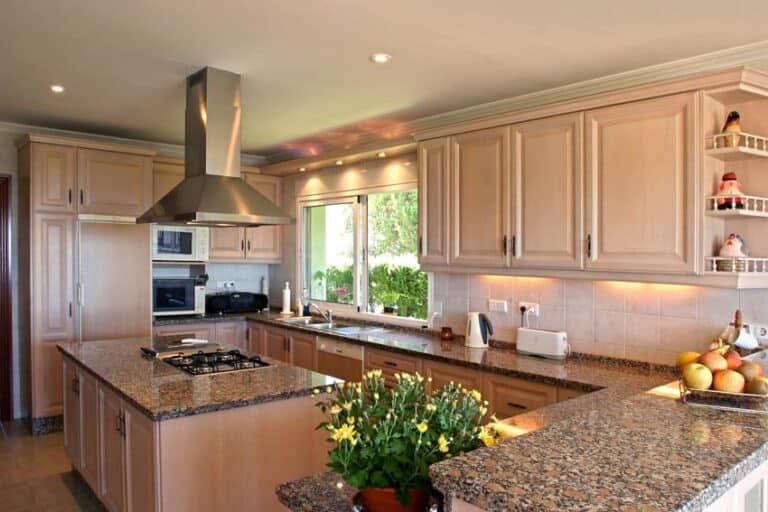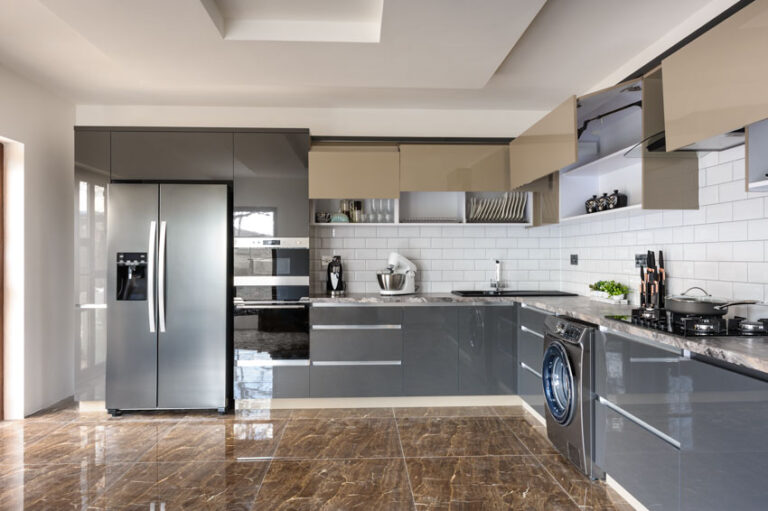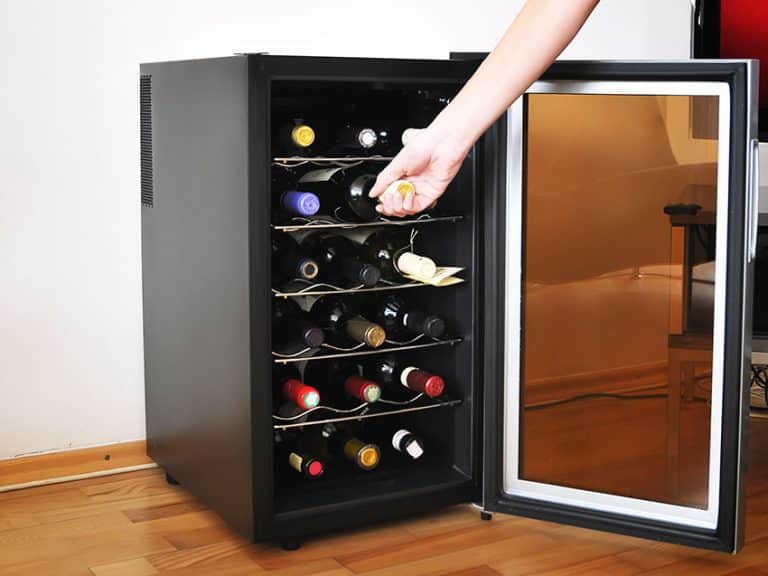What Is the Effect of Oven Cleaner on Countertops?
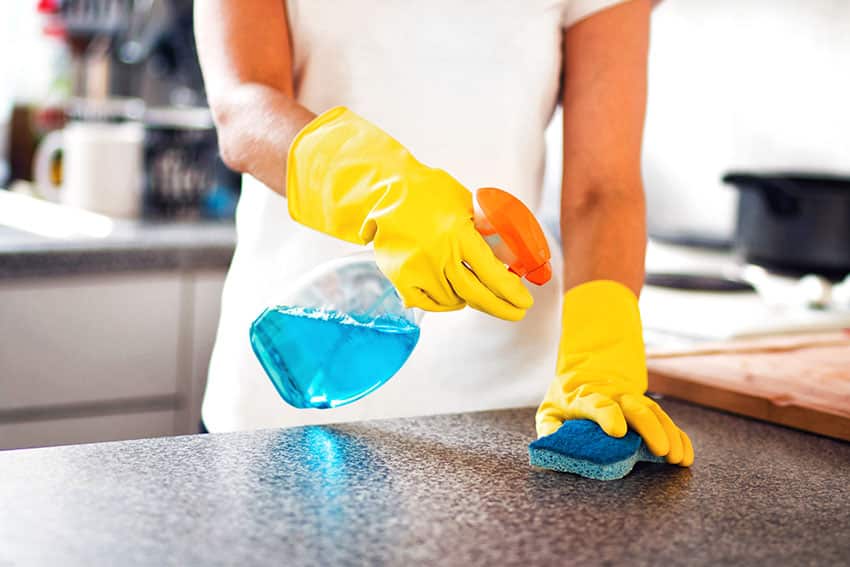
Given all the cooking and prep work in your kitchen, it’s no surprise that you might have to deal with a mess from time to time. Some messes might even leave you wondering what you can do to restore cleanliness to your countertops. While you’re scouring through your cleaning supplies, it’s tempting to reach for a strong cleaner when you’re faced with a tough mess and few kitchen cleaning supplies are as strong as oven cleaners. Yet, if you use oven cleaner on your kitchen countertop, you might end up with a bigger mess than the one you started off with.
Before anything else, let’s skip straight to the important answer about using oven cleaner on kitchen countertops: is it a good idea? Will it give you that “like-new” shine you’re hoping for? In reality, using oven cleaner to clean your kitchen countertops is going to do much more harm than good. There are a few effects you’ll notice if you start to use oven cleaner on your countertops. Remember, oven cleaner is strong enough that you could see some damage rather immediately.
In general, you can expect problems ranging from staining or discoloring the material to destroying it or call for a need for expensive repairs. The exact damage that your countertop incurs can depend on the material it’s made of as well as if it’s sealed. Sealed stone countertops, for example, are likely to hold up fairly well against a brush with oven cleaner but it definitely isn’t recommended! However, if you have quartz countertops or stone countertops with artificial colors worked into them, you’re more likely to see the color change or fade thanks to the oven cleaner.
Materials such as granite or marble countertops that are sealed will fair much better against oven cleaners than untreated stone. These protective coating that give surfaces their shine can help add some protection, however these chemicals can break down the coating over time. Formica countertops are another strong option for a kitchen. Yet, using oven cleaner on them is likely to lead to fading colors in the material.
If you opt for a more modern look or are even concerned about a professional kitchen, what would oven cleaner do to stainless steel countertops? While stainless steel is another material that holds up well enough not to cause excessive damage, you’re still likely to end up staining your countertop by using an oven cleaner.
Another less common countertop material to consider is tile. Tile countertops can be particularly frustrating to keep clean thanks to their grout lines. If you resort to oven cleaner, though, you’re only going to damage the grout and the finish on your tile countertop. If you have wood countertops, you’ll want to be careful not to use oven cleaner on your countertop ever. The disastrous results can include a reaction that can cause your countertop to bubble and effectively ruin it or at least cause some costly damages.
Why Does Oven Cleaner Damage Counters?
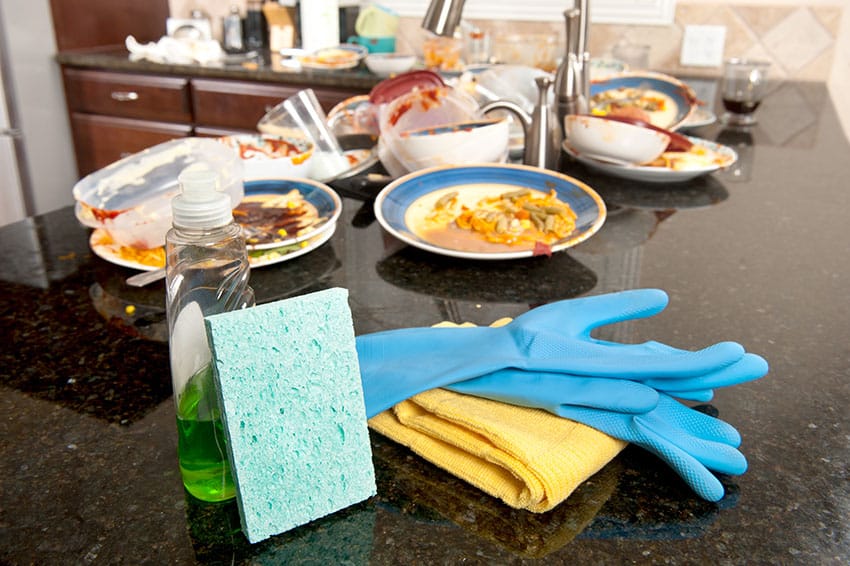
When you have an oven that needs a deep clean, an oven cleaner can really come in handy. If you use the right product properly, it can make a difference between scraping off burnt-on grime for as long as it takes and simply wiping it away once the oven cleaner works it off the surfaces in your oven.
Given that oven cleaner is well-suited to cleaning your oven, you might wonder why it has such disastrous effects on so many different types of countertops. There are a few reasons but it primarily all comes down to the fact that oven cleaners are particularly strong. They often feature ingredients that are stronger than a surface like a countertop needs and they even have corrosive and even toxic properties.
That doesn’t necessarily mean you have to fear your oven cleaner. It can definitely help get your oven looking like new after a few family dinners! However, your countertops simply don’t need exposure to these harsh ingredients to come clean and they often times damage your counters – not just the grime that may have gathered on them.
To give you an idea, these are a few strong ingredients that oven cleaners may contain. Of course, this can vary depending on the exact cleaner, so always check the ingredients.
• Butane
• Sodium hydroxide
• Turpentine
• Ethylene glycol,
• Methylene Chloride
If you aren’t familiar with these names, the basic concept here is simple. Oven cleaners often feature ingredients that are corrosive, volatile, carcinogens, and toxic. While there are ways to take precautions cleaning your oven, these materials are often harmful to surfaces like countertops that don’t need such a strong cleaner.
On top of all of this, there is another risk associated with the ingredients in oven cleaner. Since your kitchen countertop is also where you prepare food, the last thing you want is to leave any residue behind on your countertops that could come into contact with your food as you prepare it. All in all, oven cleaners are going to do a lot of damage to your countertops because it simply isn’t what these products are designed for. In a bit, we’ll take a closer look at some safer alternatives that will do your countertops a world of good.
How to Fix Countertop Stains from Oven Cleaners
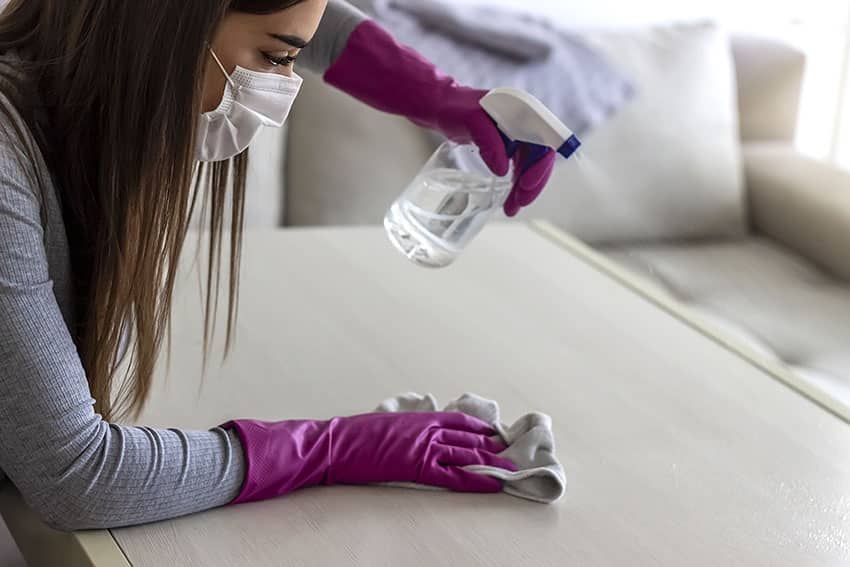
Once in a while, we all learn a lesson the hard way – it happens! The only question now is what can you do to solve it. How can you fix a countertop already stained by oven cleaners? You actually have a few options!
One common set of cleaning tools that you can try out to fix your stained countertops is the white vinegar and baking soda that’s probably already sitting in your pantry. In this case, you’ll want to create a paste that is made up of equal parts white vinegar and baking soda. Once you have that, use it to cover the stained area. It can also cut through and clean grease stains like an oven cleaner.
Don’t clean it up right away, though! Instead, you’ll want to let it sit for a day or two before wiping it up so that it can really work on the stains. If you’re worried about the area getting disturbed, you can cover the paste with plastic wrap.
Some people also turn to bleach in this situation. Before we look at this method, there are a few important things to cover here. Namely, bleach is another household chemical that you’ll want to use carefully. Not only will you want to take safety precautions but make sure that you don’t discolor your countertop further.
Use a small amount of bleach on a cotton ball and carefully work on the stains. Make sure not to work through the stains to strip the countertop and stop immediately if you notice any sort of discoloration on your countertop.
What Are the Best Ways to Clean Countertops?
Just because you can’t use oven cleaner on your kitchen countertops doesn’t mean that you aren’t out of luck when you have a particularly tough mess to deal with. Once again, though, what your countertop needs will depend on the material that it’s made of. We grouped stone together earlier but these types of countertops can range in care a bit, so it’ll depend on what type of stone you have.
To speak generally, though, you’ll want to stick to something mild. You can’t go wrong with warm water and mild soap. With stone surfaces like granite, making sure to reseal the stone regularly can help keep your counters in top shape and less likely to stain. Formica is an interesting countertop when it comes to cleaning. If you find that soap and water aren’t doing the trick as you need them to, while you can’t turn to oven cleaner, a glass cleaner like Windex might just do the trick. Similarly, a cleaning material like Pine-Sol can help with tough messes.
Stainless steel is usually easy enough to tackle with soap and water. However, from time to time you might find that you need a little something extra for appliances, stove tops, and accessories. You can use a mixture of white vinegar and hot water to spray down tough stains before jumping back in with soap and water.
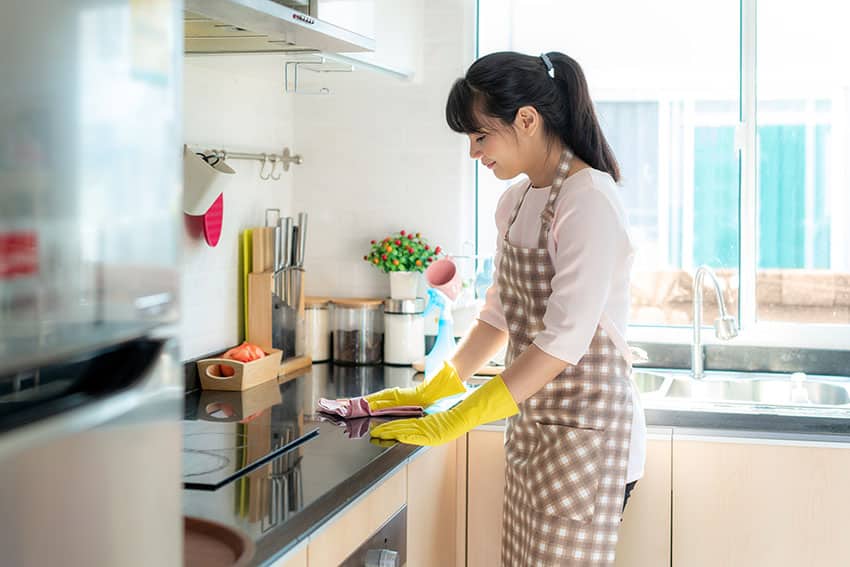
As mentioned before, you might feel tempted to use oven cleaner on your tile countertops in tackling that pesky grout. To clean it rather than damage it, though, a specialized grout cleaner for kitchens or even some baking soda and hydrogen peroxide is the way to go. A tool like a toothbrush can help you get into tight spots too.
For the tile itself, this is another place where mild soap and warm water can help clean up messes. The same is true for wood and butcher’s block countertops , but you’ll want to add the stop of making sure to wipe the area you sprayed down and using paper towels to pat it dry before letting it air dry.
After all, excess moisture isn’t great for wooden countertops either. At the end of the day, cleaning your kitchen countertop can get tough and some stubborn stains might have you considering drastic measures. However, we can’t stress enough that oven cleaner isn’t going to help keep your kitchen countertops looking their best, no matter what kind of countertop you have. It’s better to stick to safe cleaners and leave the oven cleaner just for the oven.
Do you have favorite kitchen cleaners you like to use on countertops? Share the solution you like best with our readers below. For more related content visit our guide on how to seal granite countertops here.


